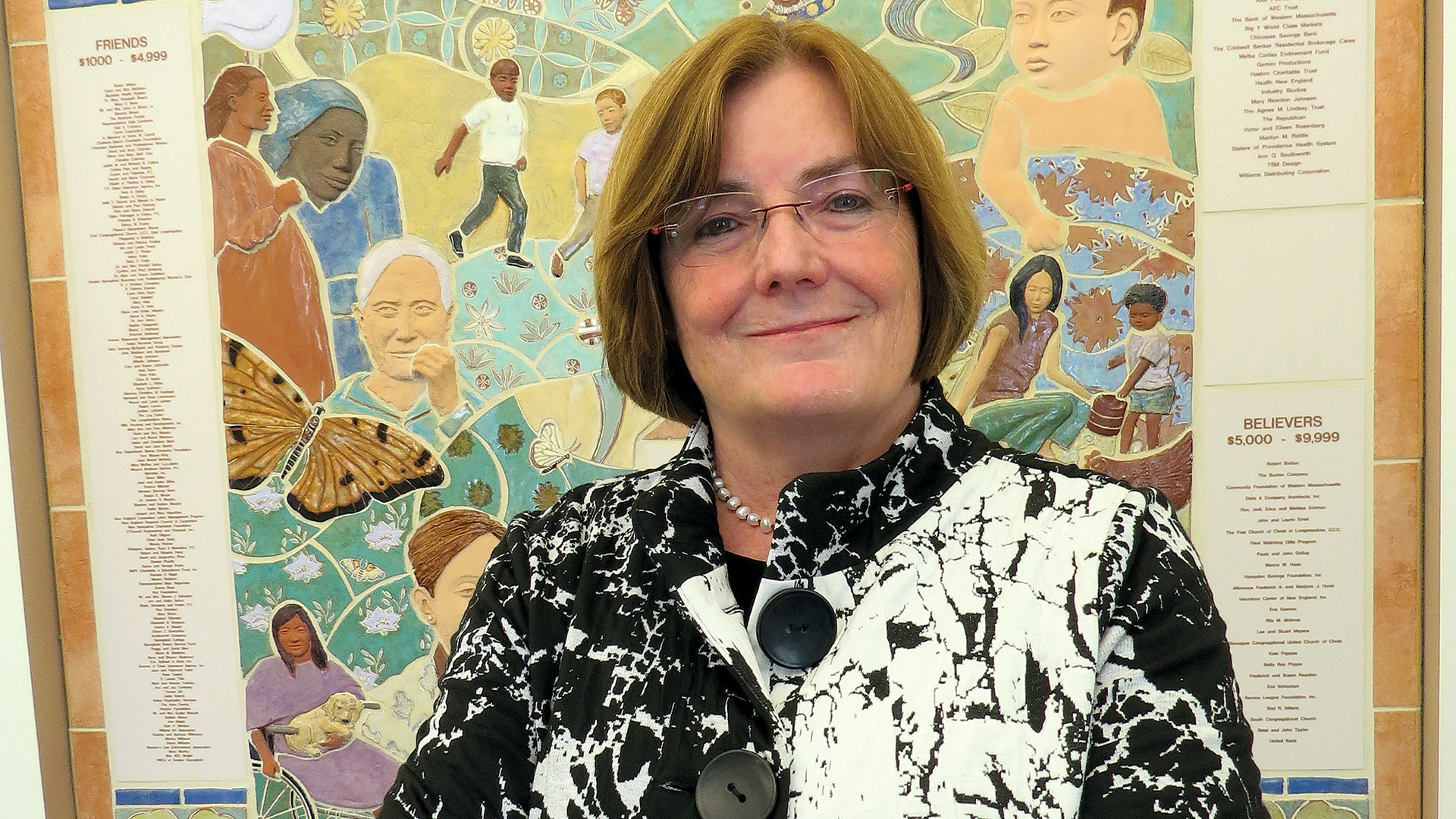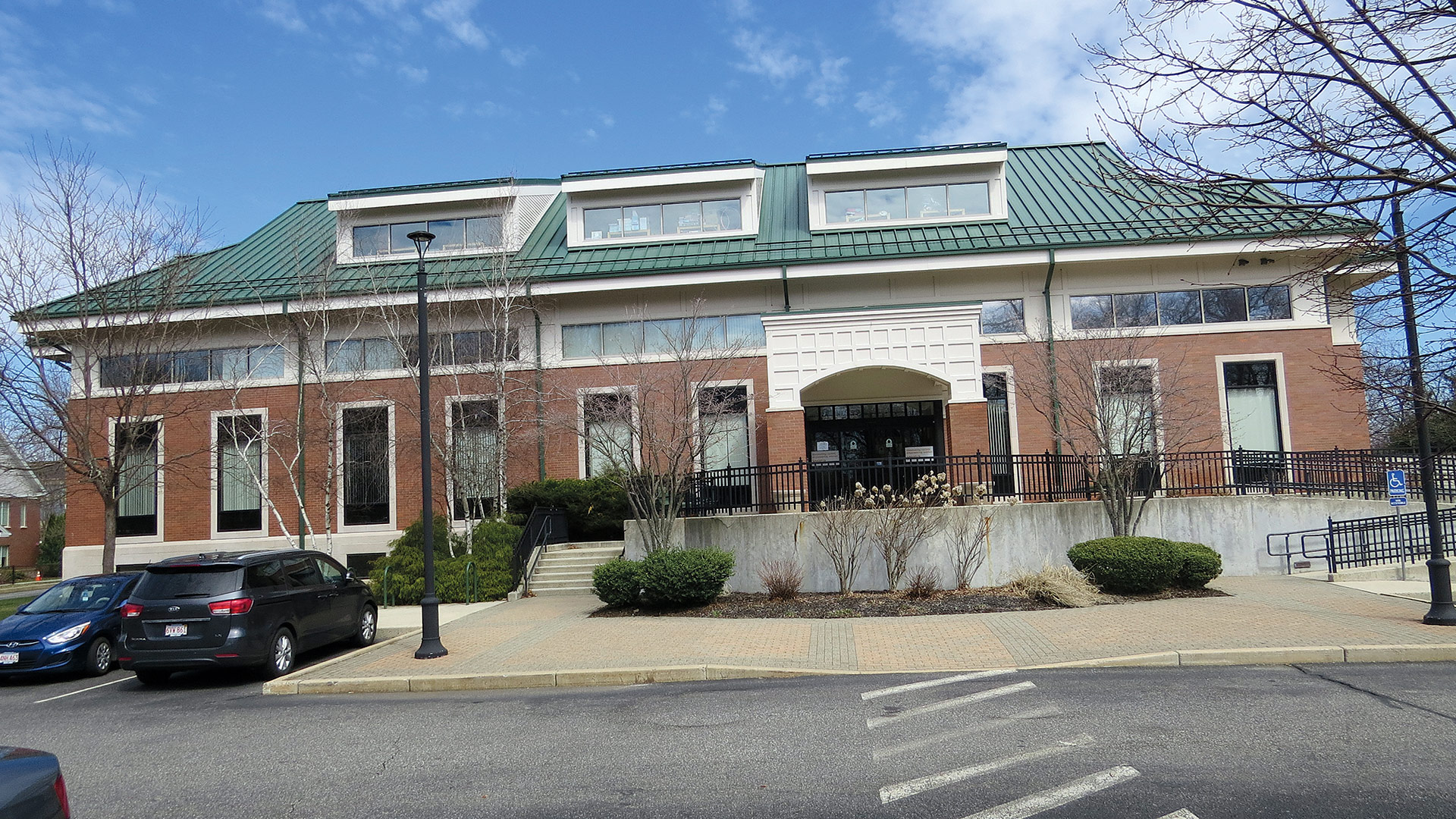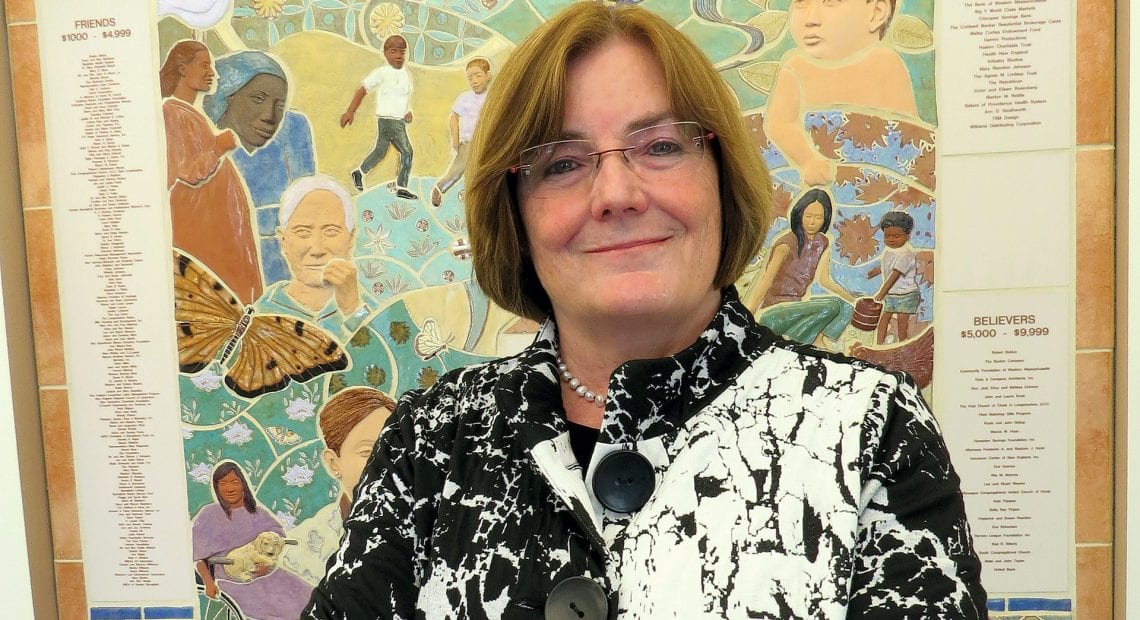Providing a Light

Executive Director Elizabeth Dineen
Helping survivors heal. That’s been the mission of the YWCA of Western Mass. for 150 years. Today, the agency does this in a number of ways, some well-known, such as its 58-bed domestic-violence shelter, and others far-less-heralded but still important, such as helping area young people attain their high-school equivalency. In each case, the key is providing these survivors with the tools they need to achieve a higher quality of life.
Azreal Alvarez calls this his third crack at high school, or the equivalent thereof.
That’s how he referred to YouthBuild Springfield, a workforce-development initiative operated by the YWCA of Western Massachusetts, a program that is succeeding where the first two stops didn’t. Indeed, Alvarez said that, when he attended one of Springfield’s charter schools, he was bullied so much, he couldn’t stay in that environment. Later, he enrolled in what he described as an online endeavor that didn’t inspire him in any real way.
That left YouthBuild as a last hope that soon became his best hope. The program is designed to not only help young people get their high-school equivalency, but also become introduced to careers in construction or healthcare.
Alavarez, 18, who wants to follow in his father’s footsteps and become a scaffolder, described the program this way: “For some people, this is their third chance or their second chance; for others, it’s their fifth. There’s really not much hope for them, so they come here, and they find a light that no one else can explain.”
With that, whether he knew it or not, Alvarez neatly summed up the first 150 years of the organization now known as the YWCA of Western Mass., the 10th-largest YWCA in the country and one of the oldest as well. Since Ulysses S. Grant patrolled the White House, it has been helping people find a light that, yes, is often hard to explain, but very often leads to a higher quality of life.
“I love this job because we’re able to serve women and children who are desperate to receive professional services, so that they can move on with their lives.”
And that light comes in many different forms, said the agency’s executive director, Elizabeth Dineen, a former prosecutor and supervising district attorney in Hampden County who spent more than a quarter-century handling special-victims cases including those involving child abuse, sexual assaults, domestic violence, and murder, and was recruited to lead the YWCA by several of its board members in 2016.
It might simply be a voice at the other end of a hotline that operates 24/7 and handles more than 10,000 calls a year, she told BusinessWest. Or it might be the peace, safety, and opportunity to start a new and better life that all come with a room in the 58-bed domestic-violence shelter. Or it might be the enlightenment gained through one of the agency’s newer counseling programs, called Children Who Witness Violence, an ambitious undertaking aimed at preventing domestic abuse, sexual abuse, and other forms of criminal behavior from becoming generational.
Or it might come in the form of exposure to a career in the medical field or construction, something a young person might never have considered as they were struggling with traditional high school, said Dineen, adding that YouthBuild and related programs are solid examples of how the YWCA has evolved and expanded well beyond its original mission and even the ‘W’ in its name.
All of this is what the agency is celebrating as it marks its sesquicentennial, an ongoing story that is driven home by the case of Linda Anselmo, who came to the agency last year at a time when she had nowhere else to turn.
A recent transplant to the area, she found herself the subject of intense and relentless verbal and emotional abuse from her partner, who, among other things, “threated to commit suicide and take me with her,” said Anselmo, noting that she was lost and alone when she found the YWCA, but never after that, thanks to the agency.
“I was completely lost — I had just moved to Massachusetts and into this relationship, and things got bad very fast,” she explained. “I didn’t know anyone, I had no family up here, nothing.”
Fast-forwarding, she said the agency helped her find temporary housing in a shelter and then transition to permanent housing in a community she chose not to disclose. More importantly, perhaps, the YWCA helped her move on from what happened to her emotionally.
“I had to heal,” she said. “I didn’t know how, but they showed me how.”
Helping people learn how to heal would be a good way to describe what Dineen and her staff of 150 do 24/7/365. For this issue and its focus on area nonprofits, BusinessWest takes an in-depth look at how the agency does just that.
Answering the Call
‘Survivors.’
That’s the word those at the YWCA use when referring to the various constituencies they serve. It works much better than ‘clients’ or ‘residents’ or any other collective that might come to mind.
That’s because all those who come to the facility at 1 Clough St. (or who simply call the hotline number) are survivors — of domestic violence, sexual assault, child abuse, bullying, human trafficking, stalking, or a combination of the above.
They find this YWCA, which serves communities in both Hampden and Hampshire counties, because, while they have survived what has happened to them, they are still in need of a great deal of compassionate help as they seek to put their lives back together. Providing that help has essentially been the mission of this agency for the past 150 years.
“I love this job because we’re able to serve women and children who are desperate to receive professional services, so that they can move on with their lives,” said Dineen, who has made a very smooth transition from the courtroom to the classroom (she chaired the Criminal Justice department at Bay Path University for several years after leaving the DA’s office) to the challenging world of nonprofit management.
Indeed, while the work address and the title on her business card are different, Dineen is, in many ways, continuing the work with survivors that marked the first 25 years of her career, work she described as both extremely rewarding but very challenging.

Azreal Alvarez says the YWCA’s YouthBuild Springfield program is his third crack at high school, and his best chance to succeed.
“When you win a case, it’s very rewarding, but when I lost a case, it was excruciating, because you knew the person was going to be released to the community and would re-offend,” she explained, providing some unique insight into a realm few really know and understand. “Overall, these are some of the most challenging types of cases to prosecute.
“Children who testify in these cases are usually testifying against someone they loved, respected, and admired; it could be a coach, a parent, a teacher, or a relative, so it’s very hard to go into a courtroom and testify against them,” she went on. “And with regard to domestic-violence cases, very often the person they’re testifying against is someone they loved or still love,” she went on. “And when you’re dealing with adult rape cases, whether the survivor is male or female, it’s very challenging; people have to talk about an extremely horrific, traumatic experience.”
Dineen said her work in the DA’s office, which focused on high-profile cases including child-abuse murders, domestic-violence murders, and sexual-assault cases, has benefitted her in a number of ways as she guides the YWCA. For starters, she has a number of connections with area law-enforcement agencies and the legal community, connections that ultimately help her and her team better serve survivors.
Meanwhile, her time in law school and then as a lawyer has certainly helped her handle all the contract work that is part and parcel to managing a nonprofit these days, and especially this one.
But the greatest benefit from her work as a prosecutor is gaining a deep and unique understanding of what survivors go through — and what services they need to move forward with their lives.
This perspective has helped in the development and refinement of a number of programs and initiatives, and it comes across clearly as she talks about facilities such as the domestic-violence shelter, which is filled 24/7 as evidence of what she called an epidemic in this country and this region. She knows about the women and families who come there because she’s operated in their world throughout her career.
“When women come to the shelter, they come very often with just the clothes on their back,” she said, adding that only those deemed to be in eminent danger are assigned rooms. “If they bring anything for their children, it’s usually some kind of comfort object like a blanket or a toy.
“Many women come here right from the hospital or a police station, or they come here when there’s an opportunity to flee their abuser,” she went on. “The person might be going to work or to the supermarket, and there’s a window of opportunity that the woman has to literally flee their abuser.
“When you come to the shelter, it’s not uncommon to see people who might have a black eye, might have chunks of hair removed, might have a cast on their arm or leg,” she continued. “These are women who have experienced and endured, in some cases, long-term physical, sexual, and emotional abuse.”
Forward Progress
Thus, when they arrive, they need a full array of services, said Dineen, listing everything from direct counseling to getting children into schools or daycare as soon as possible, for their benefit, but also to help staff members focus on helping mothers prepare for the day when they will leave the shelter; from work to secure, permanent housing to assistance with entering or re-entering the workforce.
To accomplish all this, the YWCA works with a host of partners, from area school departments and daycare providers such as Square One to Way Finders (for housing and employment services) to Dress for Success (to ensure that women have suitable clothes for an interview or the first day on the job).
“Everything we do with women once they enter the shelter is designed to make them self-sufficient and independent,” she explained. “We’re trying to create conditions of success so that when they leave, they can thrive.”
This independence and self-sufficiency almost always comes through employment, Dineen went on, noting that many who come to the shelter have been out of the workforce for some time and thus need help to re-enter it. Thus, the YMCA has a computer lab and services to help survivors write a résumé and cover letter, apply for jobs online, and conduct themselves at an interview.
“No one is sitting around the shelter,” she told BusinessWest. “When you first come here, yes, you want to breathe and maybe have a couple days of just feeling safe and being able to sleep through the night without fear, but after that … everyone is assigned a case manager who will work with this person to figure out how to get her back on her feet, get her a job, get her to be economically independent, and think about where she wants to live.”
While the domestic-abuse shelter is perhaps the best-known of the programs and facilities operated by the YWCA to assist survivors, it is just one of many, said Dineen.

The YWCA facility on Clough Street offers a number of services and programs — all of them designed to help survivors heal.
There are other residential programs, including a transitional housing program in Springfield and teen-parenting residential programs in Springfield and Holyoke, she said, as well as a human-trafficking initiative undertaken in partnership with the Hampden County Sheriff’s Office, the U.S. Attorney’s Office, the Homeland Security Department, and other local, state, and federal agencies, and a host of community programs.
These include the hotline, which Dineen called a critical service to the people of this region and even some who have moved outside it and call the hotline for tips on how to locate services in their new place of residence.
“Each one of those phone calls to our hotline is a cry for help,” she told BusinessWest. “So we try to be as incredibly supportive as possible; if we don’t have a bed available, we’ll try to help someone find another bed within this state. We try to make sure that everyone who calls knows the resources available to them.”
Other services and programs include medical advocacy at hospitals for sexual-abuse victims, sexual-assault and domestic-violence counseling, SafePlan court advocacy, services for young parents, and many others.
They are all designed to help people, like Anselmo, with what can be, and usually is, a complicated healing process.
Complicated, because survivors often try to blame themselves for the abuse inflicted upon them, which is not conductive to recovery.
“I can speak for all women when I say that we go through something traumatic … you’re lost, you’re scared, and you think ‘what did I do?’” she told BusinessWest. “That’s one of the questions that each and every one of us asks ourselves. We have to realize that it’s not us.
“The YWCA gives you tools so you can understand that domestic violence isn’t just physical,” she went on. “It’s mental, it’s emotional, and those two are really hard to heal from; the bruises, they fade, but the emotional and verbal abuse really tears you down a lot.”
Courses of Action
One program that is gaining traction — and results that may be difficult to quantify but certainly can be qualified — is the counseling service for children who witness violence, said Dineen, adding that it is designed for children ages 3 to 18 and provides tools to help those who have experienced violence firsthand, or witnessed it, to cope.
They attend nine to 12 sessions, at which they are encouraged to identify their emotions and learn how to talk about what’s bothering them rather than resort to their fists or cruel words to vent frustration.
“They talk about their feelings, and they talk about what makes a healthy relationship,” she noted, with the goal that such experiences won’t be repeated and won’t become generational, as so often happens.
And, as noted, while she doesn’t have any statistical evidence with which to show progress, she has anecdotal evidence.
“When I see kids come into our shelter and I meet and talk with them, I can see how aggressive some of them, and especially the boys, are,” she explained. “And I see how they talk to their siblings, especially their female siblings, and their mother. They can be very disrespectful and bossy; they’re repeating what they saw.
“And as I see kids go through the Children Who Witness Violence program, I can see a sea change in terms of how they interact with their moms and other females in authority,” she went on. “The moms will say, ‘thank God my child had an opportunity to participate in this.’”
As for the YouthBuild and GED workforce-development programs, they are helping young people like Alvarez get a second, or third or fourth, chance at not only finishing school, but developing self-esteem and perhaps finding a career.
The program has existed for several years, said Dineen, but recently it was retooled (a new director was hired) and expanded to include not only a construction track, but one in healthcare as well, a path more attractive to most of the young women who participate.
“They have a week on campus here where they’re taking academic classes, everything they need to pass their GED,” she explained. “And the other week they’re either doing construction — we’re partnering with Habitat for Humanity — or they’re going to Baystate Health and learning to become a certified nurses’ assistant or a phlebotomist.”
The program is starting to generate results, she said, and it is becoming a last/best option for students who have not enjoyed success in a traditional setting. And, like all the other initiatives at the YWCA, it’s focused on giving people the tools they need to succeed after they leave the agency’s programs behind them.
With YouthBuild and each of the other programs, there are measures of success, some more obvious than others, said Dineen.
“I measure success when my hotline is ringing off the hook — that shows people are using it,” she noted. “I measure success when people stay in our shelter, get the services they need, and then leave — and when they leave, they leave having a job, having safe housing, and having been through counseling so they can understand their own self-worth so they don’t need to get involved with a jerk.
“When I look at YouthBuild, I measure success by how many kids get their GED, by how many kids get a job, by kids getting certified in construction or to be a CNA,” she went on. “And I measure success when people have the courage to pursue prosecution and hold someone accountable for what they’ve done. And in all those areas, we’re seeing progress.”
Seeing the Light
Alvarez and other participants in the YouthBuild program recently traveled to the State House. There, they met with members of the Western Mass. delegation and got some impromptu civics lessons. But this wasn’t just a learning experience.
Indeed, while there, the students were also advocating for the YWCA and programs like YouthBuild, an assignment Alvarez undertook with considerable enthusiasm, telling legislators the same thing he told BusinessWest — that YWCA programs can provide light to someone who has been experiencing dark times and needs an opportunity to heal.
It’s been doing this for 150 years now, and that’s truly worth celebrating.
George O’Brien can be reached at [email protected]






